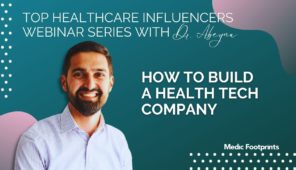NHS leader draws shunned junior doctors back to clinical practice
NHS Clinical Entrepreneur Fellowship Scheme announces that at least 15% of the doctors on the programme returned to clinical practice to participate
Professor Tony Young, Clinical Lead of NHS Innovations and the new NHS Clinical Entrepreneur Fellowship Scheme has announced that at least 15% of the 103 junior doctors on the revolutionary programme, returned to clinical practice in order to participate.
Tony stood proudly in front of over 500 innovators, thought leaders and high level decision makers in the healthcare space from across the globe at the Singularity University Exponential Medicine 2016 in San Diego, explaining the rationale behind the launch of the program and it’s early successes – attracting doctors back to clinical practice.
Historically, some of the most talented junior doctors have been forced to resign from their training programmes due to their commitments to startups or projects they’ve founded in order to transform patient healthcare.
Many of these doctors were told at the time by their seniors, that these kind of activities would not be supported or recognised as part of their training, hence would have to choose accordingly.
Most chose to leave, later setting up successful healthcare businesses or leading emerging disruptive organisations within the health tech space.
Harry Thirkettle, one of the NHS Clinical Entrepreneurs described his story 1 year ago,
Under no uncertain terms I was told I had to choose between being an entrepreneur or finishing my training.
I chose to be an entrepreneur.
Having later met Tony Young, he joined the scheme and was able to return to clinical practice part time whilst realising his entrepreneurial ambitions.
This arrangement would not have been possible prior to the scheme, due to eligibility criteria which does not explicitly support this.
Tony’s programme has taken it’s first steps in successfully transforming the deeply concerning brain drain from the NHS into a brain gain by opening the gateway for not only career opportunities for doctors, but exponential innovation within healthcare by those who should remain at the heart of it – their patients.
Tony hopes to open the programme to a wider multi-professional cohort in future years – all of whom are agents for change in the largest public healthcare system in the world.
This is the only programme of it’s kind, heavily lauded by the international crowd at Expo Medicine 2016, opening up new collaborative opportunities with multinational companies across the globe. It also comes at a time when the government has announced a 25% increase in medical school places to address the ageing workforce and increasing number of vacant posts for doctors.
Medic Footprints
Latest posts by Medic Footprints (see all)
- Alternative Careers for Doctors during COVID-19 - 5th April 2020
- Top 9 Coronavirus memes so far - 5th April 2020
- Portfolio Careers for Doctors 101: Utilising Key Strategies to Support your Life Goals - 30th January 2020


